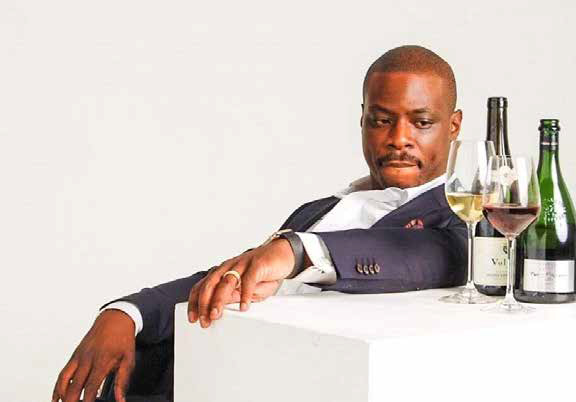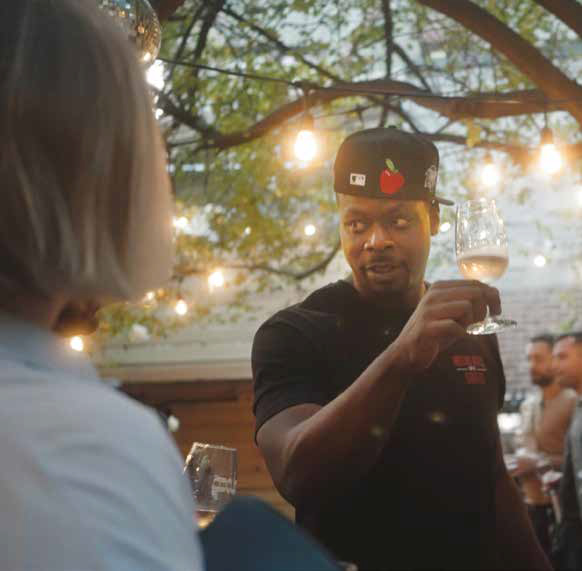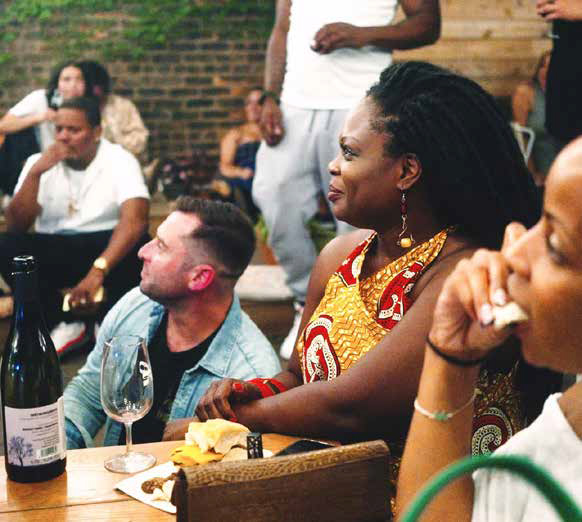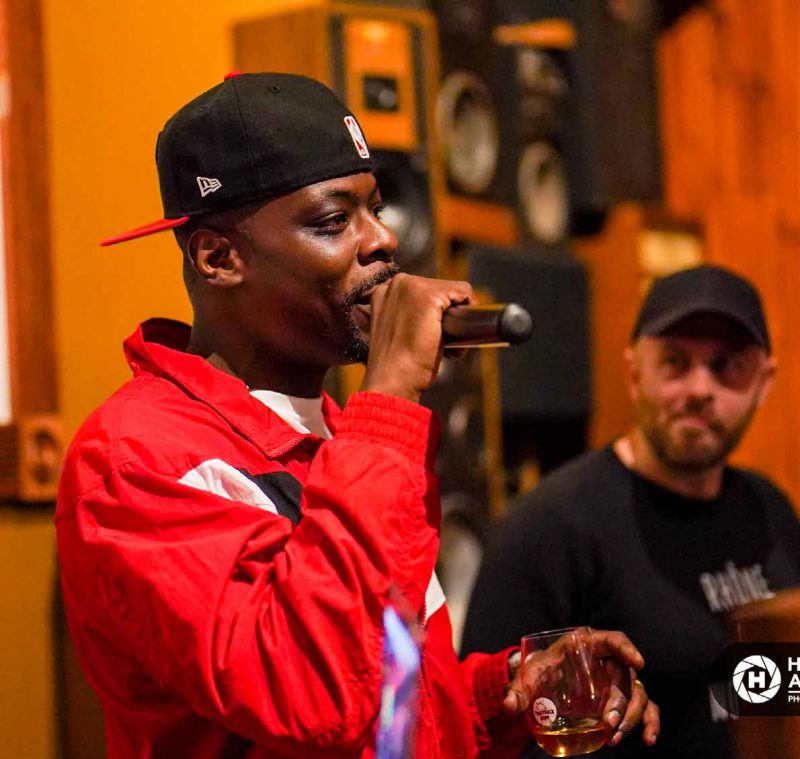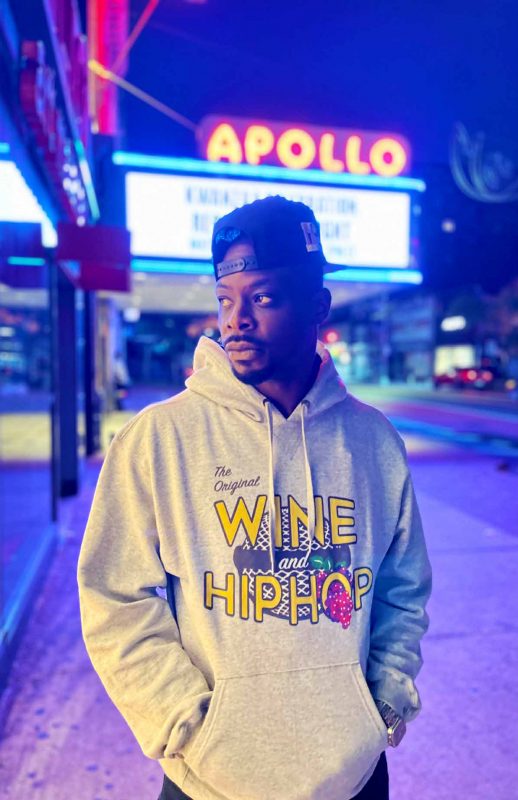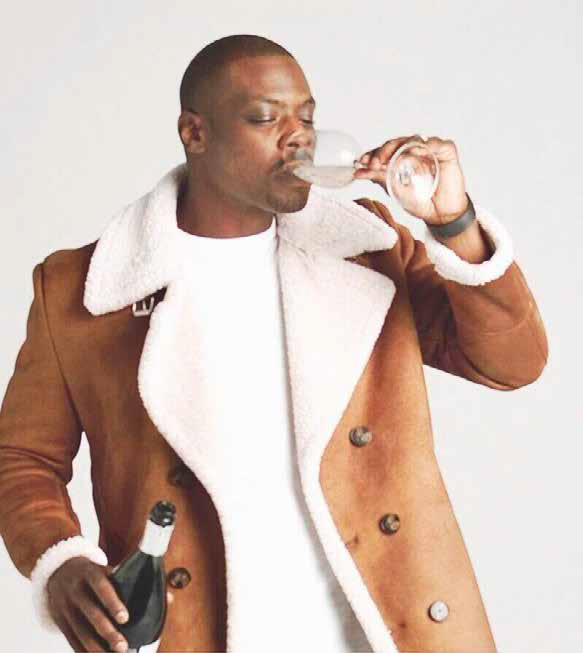This article originally appeared in the Winter 2021/2022 print issue of Quench Magazine.
Quench editor-in-chief Gurvinder Bhatia sat down for a Zoom with Jermaine Stone – aka the wolf of wine, aka the czar of vibes, aka young Thanos, to chat about all things wine and hip hop. In a broad ranging discussion, they talked about bringing the two together, changing the traditional perceptions about both, elitism, inclusivity, starting people off with the good stuff, and doing it for the intention, not the attention.
As a young hip-hop fan discovering wine in Brooklyn, Jermaine Stone, the founder of Cru Luv, a New York-based wine branding and marketing firm, definitely did not feel seen.
They didn’t know how to speak to me as a consumer. They didn’t represent people of color, they didn’t represent young people. That’s one of the reasons why I founded Cru Luv which is a creative agency dedicated to blending the best elements of wine and hip-hop in the most authentic and organic way we can.
That quest for authenticity started young. The first memories that Stone has of hip-hop was of rapping freestyle into instrumentals on the karaoke machine with his brother.
So I could always memorize the flow, and being able to flow on a beat in itself, which is, you know, that’s a skill. My brother and I, we started free-styling one day, I was probably about 12, and it had to be my first time, and I wasn’t bad. I wasn’t good, but I wasn’t bad. And my brother was horrible. So, him being the older one, he just kind of turned into nurture mode and he nurtured me into becoming an artist at a young age.
Stone’s taste in hip-hop reflected those of a young listener in the early ‘90s.
Let’s see. Wu Tang. Lots of Wu Tang Clan, lots of Notorious B.I.G. I was into anyone who was an East Coast artist, but there were also people like (West Coast rapper) Snoop Dogg who really inspired me. I was a big fan of Onyx. So, I’d say ‘92 – ‘94, those were the glory days for me, when I was really into it, towards the end of my high school, early college years. I was aggressively going after a record deal.
You know at that time, hip hop was really different, the music industry was really different. You couldn’t just throw your music online and promote it, you had to get it to different labels and hope that they listened to your demo.
My brother and I would always go and hang out in front of record labels, and that’s how we got to meet a ton of people. I ended up on one of those trips meeting LL Cool J, and he had heard me rap. LL’s people got my contact info and were really good about following up. I talked with them a bunch, and they’d signed me up for some battles, but nothing ever worked out with that. So I was really active in the underground scene trying to make a name for myself, but the love went away after I got deeper into the music business. The business of music kind of turned me off. And at that time, coincidentally, I was working my way up in the wine industry, so I just completely transitioned and started focusing on wine.
Stone shares his thoughts on the commercialization of hip-hop and wine.
They weren’t reflecting what the people really felt. It didn’t sound like it did in the basements in the Bronx that it came up in. But don’t get me wrong, it was awesome, it was just that it was the most palatable version of hip hop for everyone on a wide scale. It just lacked authenticity. It continued to grow and, you know, grew into something different. I wanted to make sure that wine culture kept its soul and hip hop kept its soul, so as wine and hip hop culture grew, and I knew it was coming, but I felt like if people that weren’t really entrenched in the culture grabbed on to it, it was going to turn into a novelty. I had to do what I had to do to jump out there, put some skin in the game and blow things up to what you see now.
But let’s go back to Stone’s first encounter with wine as a kid.
The only exposure I had to wine at that time was Sorrel. It’s a drink that they make during the holidays in the Caribbean, and my mom would put in Manischewitz wine, you know, the Concord grape. And so every once in a while when she was making this I’d dip my finger in the wine and taste it. But growing up, that was my only exposure to wine and seeing it on TV, obviously. Champagne in clubs and things like that, but at that time I didn’t associate Champagne with wine because of the way that it was exposed and marketed to us. I kind of connected it more with spirits.
What changed his experience with wine?
My reverence for wine grew when I started working on the wine auction side of things at Zachys (Wine Auctions) in the shipping department. My friend told me he was working at a liquor warehouse and they were still hiring, so I popped in my application. I didn’t even know that it was a wine storage facility. So, my first job was technically with New York Fine Wine Storage – they
supported Zachy’s wine auctions fulfillment – unpacking boxes of wine, checking the descriptions to make sure that I’m shipping the right thing and sending it out. But I noticed that the auction bottles were always treated differently, like people carrying it in extra carefully. The bottles were dusty, the wooden cases looked like they were found at the bottom of an ocean sometimes. So it just interested me. And you hear about how older wines are always more expensive. I was shipping $16,000 bottles of Petrus, you know, just seeing things like that as a young man, it interests you, and having the opportunity to drink some of these, you feel like you’re a king or something like that. It just elevates your self-worth, and that was what attracted me to wine and got me super interested.
Working in the warehouse and seeing the reverence with which some bottles were treated was intriguing to the budding wine maven, but it was when he began tasting seriously that things opened up.
I was probably in the industry for about seven years already before I even thought of it as something that reflected my personal lifestyle, and it was a bottle of, I want to say 1998 Leflaive, I forget exactly which one, but I remember the producer, and it was the first time that I got it, the first time that I totally just understood. Wow, this is what everyone’s been going crazy over this whole time.
He’d been in the industry for several years when he began thinking that this was going to be a career, but that he was also running in one spot.
I felt like I was approaching a ceiling. When you haven’t seen anyone that looks like you in a position much higher than you, you unintentionally write it off. I assumed that the highest I could go was like a logistics manager. I didn’t think that I could become an auction director at any company. Yeah, I thought there was a ceiling so I assumed that, after I hit a certain point in my career, I would just open a logistics company.
But I was hired by Wally’s (Auctions) to become a founding director, and that was at about nine and a half years in. That opened me up to realize like, you still have a much longer way to go here. There, they were tapping into my entrepreneurial spirit, and because we were working with them in a startup phase, that interested me in a completely different way. I always assumed that I would be an entrepreneur. Getting those training wheels, and working with the Wally’s family like that, that was big for me.
As a person of color, Stone experienced some ignorance from customers not used to seeing an African American in his position.
That’s kind of where you experience some ignorance, you know, asking ‘why? How did you start doing this, what are you doing here?’ Like, you’re not asking my white counterpart that. I walk in as a manager with a white assistant, and they will talk to the white assistant and think I’m the help. Things like that happened a lot, but internally from the industry I’ve definitely been brought along. I feel like people have always felt that I was in a unique space and were kind of interested and wanting to get to know about it. I feel like I’ve been pretty well received. There’s some ignorance here and there with some customers, and every once in a while misunderstandings from people making assumptions.
Wine and music are both art forms with parallels, especially in that they both elicit emotions. Stone has various methods for bringing the two together.
One is the vibe. You think about the vibe that you will enjoy a particular varietal in and the vibe you will enjoy a specific song in. You might be just getting your evening started and you think about what you’re drinking in that situation, something maybe high acid, light and refreshing. If you’re in a more somber mood and chill, having a conversation, maybe something a bit more full-bodied and more complex that’s going to provoke conversation. And it’s the same thing with music and moods. You can also look at it in terms of the type of people that are connected. The whole thing behind passion vs. patience. Winemakers and people who make music have to have both and I realized that there was a similar mindset.
When I first started connecting wine and music I wanted to try to connect with people, you know, go to influencers in wine and influencers in music and show that these people are connecting together so that people that see themselves in these influencers, they can feel connected and say ‘hey, I can do that too.’ The same way that I mentioned I didn’t see anyone that looked like me and spoke like me, and that deterred me from thinking that it was even a possibility. I wanted to create those possibilities in people’s minds by showing them people that looked like them and spoke like them enjoying wine in a very honest and enthusiastic way. But also I wanted to show that the wine community appreciates and is receiving these people well. It helps make it more inviting. They don’t know that there are cool people like you and I that exist. I wanted to expose the fun side of wine.
That didn’t mean that it wasn’t difficult for Stone, at least initially.
I’ve had people say ‘this is not going to work, focus on something else like selling wine to people that are already buying it. It will be a lot easier.’ Other people have said ‘good on you for fighting the good fight’ in the most sarcastic way. But other people are like ‘wow this is really cool, thank you for doing this.’ And you know the people that see themselves in me, and the guests on our show, are from all different walks of life. That’s what inspires me just seeing how well received it’s been.
Stone speaks to elitism in wine.
It’s a top down thing from the wine industry, and when I say top down I think of the winemaker at the top, you know, it all starts with the winemaker and gets misconstrued in the middle where people think wine is this elitist thing, and it can only be enjoyed by the elites, but it started with the hard working farmers that are busting their ass every day. So when I think about that I think about the mentality of the winemakers that I’m seeing, which is a much more modern, cool and much more inclusive approach. That mentality is out there when they’re creating the wines, but also in the marketing. Wine labels, the names of the wines, they’re trying to attract a different type of wine drinker now.
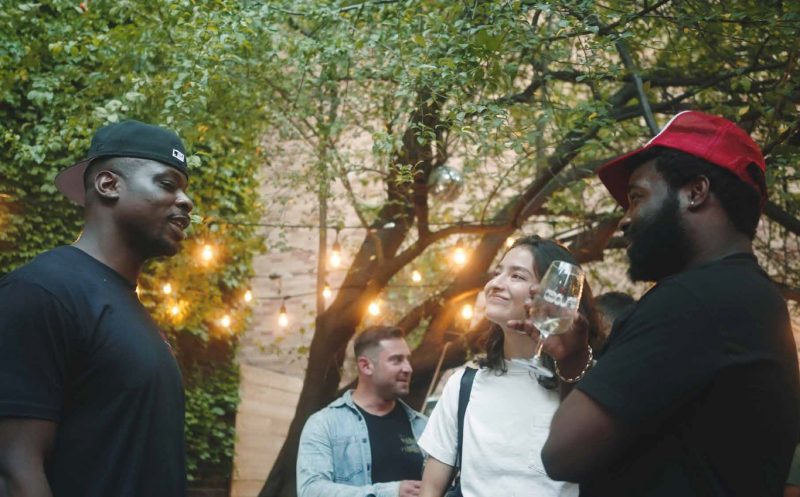
There was a point in the wine industry where they started trying to clean up some of the super racist, super sexist shit. And people are owning that shit and trying to clean it up. And I’m seeing that from the top down, which is very inspiring.
Stone believes that getting diversity at the decision making level is when we’ll actually start to see real change as opposed to tokenism.
It’s exactly what we need. The people that are making the decisions have to understand the people that are drinking the wine. I noticed when going door to door with the brands that I work with, I’d speak to different store owners, and they’d say, ‘Oh, my people don’t drink that, my crowd doesn’t drink that,’ you don’t even look like the people that you’re selling this wine to so how do you know? It’s crazy. The people that are making the decisions don’t truly understand the audience that they’re selling to, so the more that that happens, and it’s happening a lot more because of a ton more younger entrepreneurs, I think you’re going to see a lot more understanding in the coming years.
On food and its connection to making wine and hip hop more accessible.
No one’s sitting down and writing a bunch of tasting notes for a meal, it’s like ‘this is just delicious.’ No, I agree. I think that it’s happening, I see it happening, honestly with the decline in white tablecloth service restaurants. I also think restaurant culture is getting a lot younger. I was actually inspired by a restaurant here in New York called Charlie Bird. Yeah, I love that place, all they play is hip-hop, but they have one of the best wine lists in New York City. And amazing food, so it was just so elevated. That’s one of the places that let me see that the world is ready for this. But I think the food, you know guys like the Ghetto Gastro (New York based collective of chefs and food enthusiasts) are out there doing similar things to what we’re trying to do for wine. So, I see it happening.
Stone recently returned from Italy and discusses his experience and pulling influences from different cultures.
In Italy, wine culture and food culture are truly one and the same. It’s like you don’t have a meal without wine, that’s just how it is. So I take that and I think about initiatives that I have like Tasting Notes from the Streets, which is a wine and food pairing show, but it’s really a show about the culture behind the food and wine is really a character on that show. Like, this is how you can apply wine to this part of your culinary life. But I pulled different things from different places, like I just love French wine. I definitely celebrate French wine a lot, and there’s just so much history there.
What is the next step to continue the evolution for Stone and Cru Luv.
Right now we want to grow and develop our video content. It’s all about reaching the people. And I know that my crowd really digs into that great looking video content. We want to continue to find different ways to connect wine and hip hop. I think the next big step is in media, and events surrounding the media that we are doing. Tast-ing Notes From the Streets is a video and event series. The show is about my friend Terrence and I traveling around New York City, pairing our favorite foods from the hood with the best wine from all over the world. The first episode we’re pairing German Pinot Noir with Jamaican beef patties and it’s amazing. Two weeks later, there was an event where you could link with us, and drink German Pinot Noir and eat Jamaican beef patties. We want to do much more of that, find ways to not just create the conversation, but create the activation.
Stone sees more and more young people getting into the industry and doing things differently as the older generation’s power starts to wane.
What I’m finding with this generation is everyone wants to be heard. Everyone has something to say, and they want their opinion out there, so I think there’s going to be a lot more of that. You want to put that beacon out to say ‘hey, I’m one of you, and I want to find you so we can drink and enjoy wine together.’ The wine social media community is only going to grow, and that’s going to encourage more bloggers and more content creators. That’s what I see happening.
With so much information readily available, Stone suggests ways to sift through the noise and find information that is useful and credible.
I try to look for genuine people. I have this saying, ‘do it for the intention, not the attention.’ And whenever I see someone that’s doing something for the attention, they’re just making a novelty out of themselves. That’s when I’m just like, ‘okay, we don’t need to watch that video.’ Not to say that everything needs to be super serious, but pay attention to what you’re doing, take the time. I’ve seen people spouting out incorrect knowledge and it just shows the amount of attention that they pay to their craft and what they’re putting out. The safe bet is the best bet, you know, go with people that put the energy and time into creating good solid content. Keep your eye out for people that are paying attention to what they’re doing and are putting out quality content. That’s how I sift through the madness.
On the industry’s counter-intuitive strategy of mass marketing low quality sugar-laden wines to the average consumer vs. encouraging them to drink better, and that doesn’t mean more expensive, but just drink better quality and ultimately the entire industry will benefit.
There’s a guy I interviewed, Marquis Williams from Highly Recommended (a wine club in NYC). He’s on a similar mission to me where he’s trying to give better wine to his community. And he actually said ‘start people off with the good stuff.’ You know, why start them off with crap if you know it’s crap. I’m like, that makes total sense. That’s how I started out, I started out in wine auctions drinking high quality wine so, give people the opportunity to taste great wine and let them make the decision.
He has connected with an impressive list of people, but Stone still has a long list of those he would like to interview.
We pride ourselves on interviewing the diversity of people that are connected through this beverage. We’re still trying to get the Jay Z interview, fingers crossed, he hasn’t answered my calls yet, but, I would
love to interview Big Daddy Kane because I know he’s a serious wine drinker and he knows this stuff. I’d love to interview Lebron, and I don’t think he’s too far away, man, if he knew Wine & Hip Hop existed, he would want to get on the show.
So what’s up next for Stone?
We’re a bit behind because we planned on doubling down on events in 2020. Obviously that went out the window and we transitioned into doing digital events and that helped the business grow a lot. I think Cru Luv is going to be the next LVMH having a variety of different high end products focused at a certain demographic and we’ll be known for quality. But we will be innovators and game changers. The amount of shows that I have in my mind I don’t have time for, you know, I see us definitely going to more network driven things, like right now on the wine show, which is a really cool show that’s on the Sundance Network here in the US. I can totally see us branching out doing a lot more media, a lot more events and putting out more new brands.
We worked with Raekwon from Wu Tang, when he created Licataa. We helped him source the wine, but we also helped with the creation of the brand. But that’s how I see us working. There might be some things that are not celebrity driven at all, and simply culturally driven, and figuring out how to connect the culture of where I come from, with where the wine may be from. I love imported stuff so I can totally see importing a lot more wines. I definitely think we’ll be work-ing with someone from Germany, at some point, as well as wine from Portugal. I definitely have some affinity for port wine. But we definitely have a long way to go.
And what do Stone’s friends from his hip-hop days think of his venture?
They love it, they think this is so cool. Those are the guys that keep connecting me with all the artists that I’m interviewing. So they’re all about it and they see the need for this as well.

